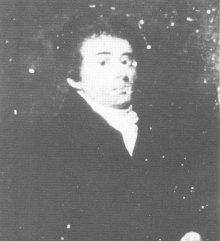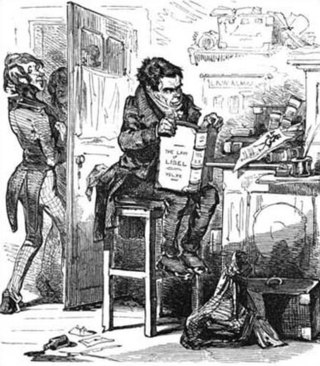Related Research Articles

George Fox was an English Dissenter, who was a founder of the Religious Society of Friends, commonly known as the Quakers or Friends. The son of a Leicestershire weaver, he lived in times of social upheaval and war. He rebelled against the religious and political authorities by proposing an unusual, uncompromising approach to the Christian faith. He travelled throughout Britain as a dissenting preacher, performed hundreds of healings, and was often persecuted by the disapproving authorities. In 1669, he married Margaret Fell, widow of a wealthy supporter, Thomas Fell; she was a leading Friend. His ministry expanded and he made tours of North America and the Low Countries. He was arrested and jailed numerous times for his beliefs. He spent his final decade working in London to organise the expanding Quaker movement. Despite disdain from some Anglicans and Puritans, he was viewed with respect by the Quaker convert William Penn and the Lord Protector, Oliver Cromwell.

John Bunyan was an English writer and Puritan preacher best remembered as the author of the Christian allegory The Pilgrim's Progress, which also became an influential literary model. In addition to The Pilgrim's Progress, Bunyan wrote nearly sixty titles, many of them expanded sermons.

Robert Barclay was a Scottish Quaker, one of the most eminent writers belonging to the Religious Society of Friends and a member of the Clan Barclay. He was a son of Col. David Barclay, Laird of Urie, and his wife, Lady Katherine Barclay. Although he himself never lived there, Barclay was titular governor of the East Jersey colony in North America through most of the 1680s.
Thomas Ellwood was an English religious writer. He is remembered for his relationship with poet John Milton, and some of his writing has proved durable as well.

Griffith Jones was a Welsh minister of the Church of England and a promoter of Methodism. He is best known for spreading literacy in Wales with his circulating schools.
The Religious Society of Friends began as a proto-evangelical Christian movement in England in the mid-17th century in Lancashire. Members are informally known as Quakers, as they were said "to tremble in the way of the Lord". The movement in its early days faced strong opposition and persecution, but it continued to expand across the British Isles and then in the Americas and Africa.

Mary Carpenter was an English educational and social reformer. The daughter of a Unitarian minister, she founded a ragged school and reformatories, bringing previously unavailable educational opportunities to poor children and young offenders in Bristol.

Quaker views on women have always been considered progressive in their own time, and in the late 19th century this tendency bore fruit in the prominence of Quaker women in the American women's rights movement.
Mary Webster was a resident of colonial New England who was accused of witchcraft and was the target of an attempted lynching by friends of the accuser.

Quakers are people who belong to a historically Protestant Christian set of denominations known as the Religious Society of Friends. Members of these movements are generally united by a belief in each human's ability to experience the light within or see "that of God in every one". Some profess a priesthood of all believers inspired by the First Epistle of Peter. They include those with evangelical, holiness, liberal, and traditional Quaker understandings of Christianity. There are also Nontheist Quakers, whose spiritual practice does not rely on the existence of God. To differing extents, the Friends avoid creeds and hierarchical structures. In 2017, there were an estimated 377,557 adult Quakers, 49% of them in Africa.

Thomas Wynne was personal physician of William Penn and one of the original settlers of Philadelphia in the Province of Pennsylvania. Born in Ysceifiog, Wales, where his family dated back seventeen generations to Owain Gwynedd, he accompanied Penn on his original journey to America on the ship Welcome.

William Benbow was a nonconformist preacher, pamphleteer, pornographer and publisher, and a prominent figure of the Reform Movement in Manchester and London. He worked with William Cobbett on the radical newspaper Political Register, and spent time in prison as a consequence of his writing, publishing and campaigning activities. He has been credited with formulating and popularising the idea of a general strike for the purpose of political reform.
Dorothy White was an English Quaker and writer of religious pamphlets. These give useful information on Quaker beliefs at that time, for instance, in relation to the Inner Light.
Sarah Blackborow was the English author of religious tracts, which strongly influenced Quaker thinking on social problems and the theological position of women. She was one of several prominent female activists in the early decades of the Society of Friends, notable also for originating a scheme to distribute aid to London prisoners.
Jane Fearon was an English Quaker pamphleteer born in Great Broughton, Cumberland. Having had "a godly education", she became a Quaker minister in about 1688. She preached on the Isle of Man, incurring a prison sentence for doing so, and in various parts of Britain.
Theophila Townsend was a Quaker writer, preacher, and activist from Cirencester, Gloucestershire, England.
Isabel Yeamans was an English Quaker preacher, and daughter of Margaret Fell and step-daughter of George Fox, co-founders of the Religious Society of Friends.

Mary Dudley born Mary Stokes was a British Quaker minister. Despite having four step children and five of her own children, Dudley, preached throughout Britain and Ireland. She was recognised as a role model because the freedom granted to her, as a woman, allowed her to achieve more.
Thomas Camm (1640/41–1708) was an English Quaker minister and writer. He was imprisoned for not paying tithes in 1674; fined for unlicensed preaching in 1678; and imprisoned, probably for preaching, from 1680 to 1686. He published religious tracts.
Martha Simmonds was an English Quaker and author. She published a number of pamphlets after her conversion. She then obtained a release for James Naylor from Exeter jail. She then proceeded with him where he entered Bristol in what was judged to be a blasphemous manner. Naylor escaped with his life, but he was given cruel punishment.
References
- 1 2 3 4 Virginia Blain, Patricia Clements and Isobel Grundy, eds: The Feminist Companion to Literature in English (London: Batsford, 1990), p. 302.
- 1 2 3 Minute Book of the Men's Meeting of the Society of Friends in Bristol, 1667–1686 (Reprinted by Bristol Record Society, 1971): p. 199 Retrieved 12 November 2017.
- ↑ National Library of Australia Retrieved 13 November 2017.
- ↑ Obituary and life by John Whiting and some Stirredge writings: Retrieved 15 November 2017.
- ↑ The British Library: Retrieved 25 November 2017.